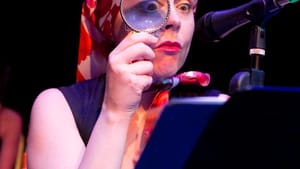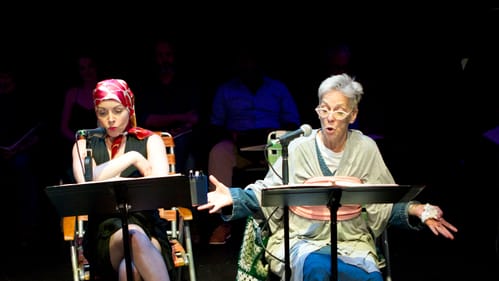Stay in the Loop
BSR publishes on a weekly schedule, with an email newsletter every Wednesday and Thursday morning. There’s no paywall, and subscribing is always free.
Shades of grey
11th Hour Theatre Company presents 'Grey Gardens'

11th Hour Theatre Company opens its season with a concert staging of Grey Gardens, the 2006 musicalization of Albert and David Maysles’s groundbreaking documentary. Both the show itself and this production only fleetingly capture what made its central subjects — Edith and Edie Bouvier Beale, the reclusive aunt and cousin of Jacqueline Kennedy Onassis — so charming, maddening, and fascinating.
The adaptation, with a book by Pulitzer Prize winner Doug Wright and score by Scott Frankel and Michael Korie, smartly balances the squalor and decrepitude shown in the 1975 film with a glimpse of the New York social world from whence the Beales came. A 1941 garden party occupies the entire first act, when Grey Gardens — the family’s palatial estate in East Hampton, New York — was “decked out in its prime,” as the characters sing.
The dramaturgy suggests that an aborted engagement between Edie Beale (called “Little Edie” to distinguish herself from her mother) and Joseph Kennedy Jr. set in motion the family’s tragic fall from society’s upper strata. The pair’s advantageous marriage is doomed by Big Edith’s strong will, Little Edie’s delusions of grandeur (she longs for a stage career), and a plethora of hidden family secrets.
Stripped down
Given the production’s concert staging — music stands, no scenery, and minimal props — director Steve Pacek really can’t communicate the opulence the first act of Grey Gardens really needs. But the actors in the 1941 section still need to convey a higher level of comfort with the privileged world they occupy. Only Charles Gilbert, as the family’s crusty patriarch, fully seems to the manner born.
Lindsie VanWinkle-Guthrie plays Big Edith in the first act, a “silly woman” who takes herself very seriously. Unlike her fully bohemian daughter, Edith’s artistic aspirations arise from her seemingly secure position as a woman of means; she gives concerts as a curiosity in her living room, and makes private records with her in-house accompanist, George Gould Strong (Larry Lees, who could do more to resist the role’s queeny stereotype).
A domineering attachment to Little Edie lies at the core of Big Edith’s being, a divergent desire to see her daughter married well that fights an urge to keep Little Edie all to herself. VanWinkle-Guthrie struggles to express complicated psychology, and her interactions with Kristen Devine’s Little Edie lack a certain combustible energy. It doesn’t help that Devine sings consistently under pitch, accentuating an already chirpy, unpleasant vocal tone.

Poor pairing
The material goes off the rails in the second act, when it moves to the dilapidated Grey Gardens of the 1970s. The show largely fails to explore the underlying psychology behind the Beales’s perilous fall from grace. Wright’s libretto dwells too deeply on the film’s memorably zany moments — Little Edie’s “revolutionary costume for today,” her patriotic flag dance — while eliding the serious subject matter at the story’s core.
VanWinkle-Guthrie returns as grownup Little Edie. Although she lacks the vocal bloom of Christine Ebersole, the role’s storied originator, she fares better here, showing off Edie’s spirited side without slipping too far into caricature. She provokes genuine pathos in the showstopping “Around the World,” a gorgeous ballad about the roads not taken in life.
Unfortunately, she’s paired with D’Arcy Webb’s Big Edith, who overplays the role like a wacky sitcom aunt. Any sense of vestigial pride or dignity is entirely absent from her schtick-sodden performance.
Pacek hasn’t figured out how to imbue the central performances with their missing subtext. I longed for a sense of the uncomfortable, codependent relationship that continually brought Little Edie back to the nest, no matter how hard she tried to escape.
VanWinkle-Guthrie’s mawkish performance of “Another Winter in a Summer Town,” Little Edie’s last-ditch declaration of independence, didn’t express that struggle — nor does it impart a necessary sense of lingering self-respect for the character, an emotional ambiguity that renders her sympathetic and even tragic.
The enduring genius of the Maysles’s Grey Gardens is its refusal to treat the women it chronicles as mere camp figures. Their inner lives ring out in pleasurable and often painful ways. The musical only shows that element fleetingly, distilling them into something obvious and ordinary. You may leave humming, but you won’t feel haunted.
What, When, Where
Grey Gardens. By Doug Wright, Scott Frankel, and Michael Korie; Steve Pacek directed. 11th Hour Theatre Company. Through October 14, 2018, at the Proscenium Theatre at the Drake, 302 S. Hicks Street, Philadelphia. (267) 987-9865 or 11thhourtheatrecompany.org.
Sign up for our newsletter
All of the week's new articles, all in one place. Sign up for the free weekly BSR newsletters, and don't miss a conversation.

 Cameron Kelsall
Cameron Kelsall